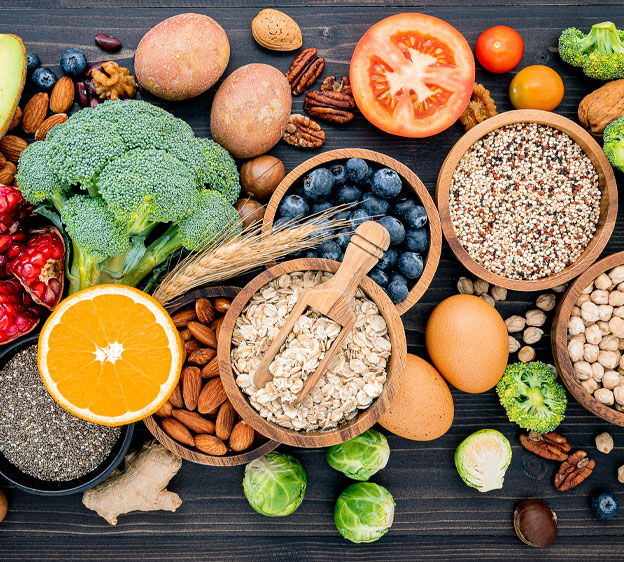
Finding out you have high cholesterol is cause for concern — high cholesterol can lead to a higher risk of heart disease and stroke. But the good news is that you don’t necessarily have to rely on medication, which can cause unwanted side effects, to improve your cholesterol. By eating a heart-healthy diet and making other lifestyle changes, you can lower your cholesterol naturally.
High Cholesterol and Your Heart Health
Cholesterol is a fatty, wax-like substance that circulates in your blood. Your body needs it to function properly. Cholesterol is used to make vitamin D and hormones, as well as build cells and help you digest food. But your liver already produces all the cholesterol your body needs. The rest of your cholesterol comes from the foods you eat.
“When you eat too many foods high in saturated or trans fats, your liver makes more cholesterol than your body needs,” says Kimberly Edwards, registered dietitian at Beaufort Memorial. “It can then build up on the walls of your arteries, blocking or reducing blood flow to your heart and brain.”
There are two types of cholesterol, low-density lipoprotein (LDL) and high-density lipoprotein (HDL). LDL is sometimes referred to as bad cholesterol because this is the kind that can cause plaque buildup on the walls of your blood vessels. HDL, or “good” cholesterol, carries cholesterol from your body back to the liver, where it is then cleansed from your body. If you have too much LDL and not enough HDL in your blood, your risk for cardiovascular disease and stroke increases.
The Downside of Medication
Statins, one of the most commonly prescribed types of medication, are effective at lowering LDL cholesterol. However, some people find them difficult to tolerate. The most common side effect is muscle pain and discomfort. Digestive problems also occur frequently in many people on statins.
Other side effects, depending on the type of statin, include dizziness, headaches and joint pain.
A Heart-Healthy, Low Cholesterol Diet
One of the best ways to lower your cholesterol without medication and improve your heart health is to eat a heart-healthy diet.
Read More: Diet and Heart Disease: Good (and Bad) Eats
“A diet rich in fruits, vegetables, whole grains and lean sources of protein can not only help you get your cholesterol in a healthy range but also help you lose weight and lower your blood pressure,” Jenny Craft, Registered Dietician at Beaufort Memorial says.
The following foods can help you improve your cholesterol:
- Fish high in omega-3 fatty acids: Choices including salmon, tuna and mackerel are high in omega 3s, which can help raise your HDL cholesterol and lower your risk of heart disease and stroke.
- Foods high in soluble fiber: Soluble fiber can help lower your LDL by preventing your body from absorbing too much cholesterol. Aim on consuming 5 to 10 grams of soluble fiber per day. Good choices include whole grains; beans, such as navy and kidney beans, and lentils; fruits, such as apples, grapes, bananas, strawberries and citrus fruits; and vegetables, such as eggplant and okra
- Soybeans, tofu and soy milk
- Foods fortified with sterols and stanols: Extracted from plants, sterols and stanols stop the body from absorbing too much cholesterol. They are added to many foods and are available as supplements. Getting 2 grams a day can lower LDL by 10%.
The worst foods for high cholesterol are those high in saturated and trans fats, such as red meat, fried foods, baked goods, processed foods and whole-milk dairy products. These foods can increase your levels of bad LDL cholesterol. If you have high cholesterol, aim to consume less than 200 milligrams a day of cholesterol, which is found in animal foods, such as liver, egg yolks and shrimp.
Read More: Food Rules for a Healthy Heart
A Healthy Lifestyle
In addition to upgrading what you eat, there are several other important lifestyle changes you can make to help reduce cholesterol without taking medication.
- Lose weight. By reaching and maintaining a healthy weight, you can lower your LDL cholesterol, as well as reduce your risk for diseases such as Type 2 diabetes and high blood pressure.
- Get plenty of exercise. Aim to get 30 minutes of physical activity that gets your heart pumping most days of the week.
- Control stress. High stress levels can have a negative impact on your cholesterol. Try relaxing activities, such as yoga and meditation, to control stress.
- Quit smoking. Swearing off cigarettes can help raise your HDL.
